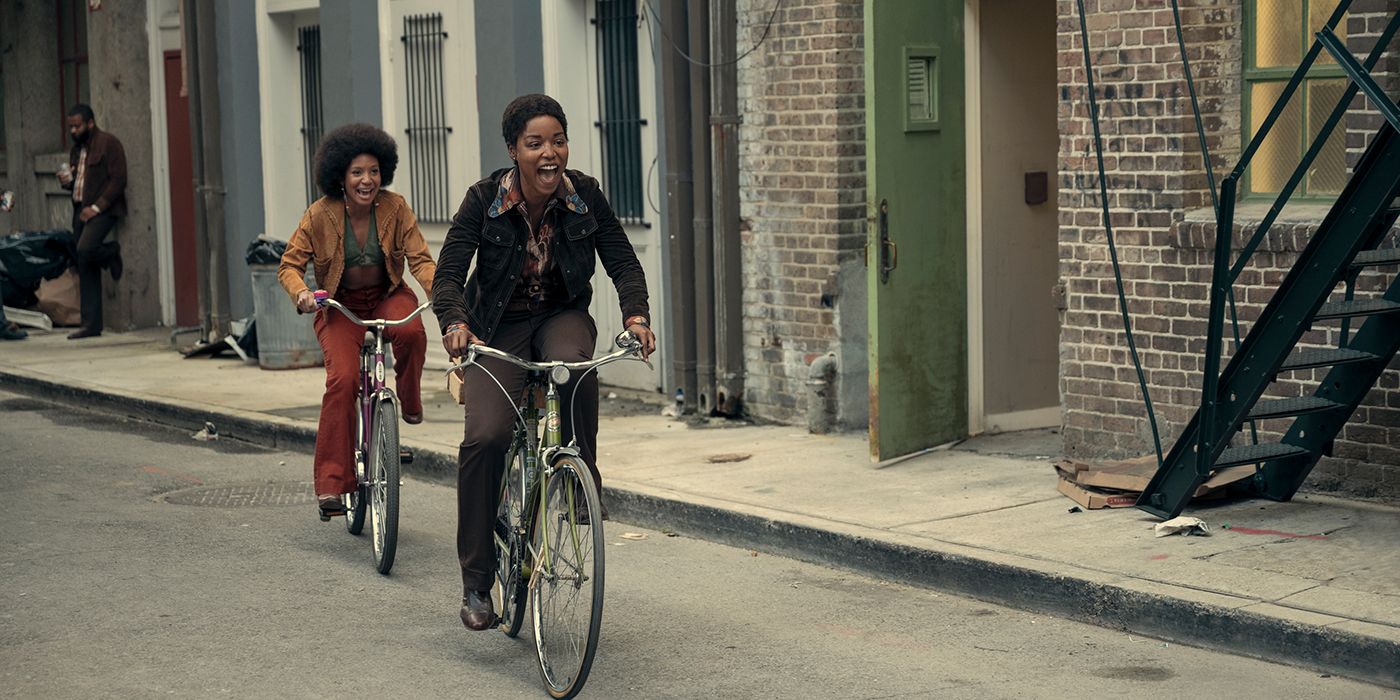Editor's Note: The following contains spoilers for Episode 7 of Daisy Jones and The Six.Music buffs and cinephiles alike who want to relive the incredible cultural, social, and political transformations that occurred within American music in the 1970s have a major treat on their hands thanks to Amazon Prime’s Daisy Jones & The Six. Based on the bestselling novel by Taylor Jenkins Reid of the same name, the series follows the tumultuous rise and fall of a rock band as clashing egos within the group result in tensions both on and off the stage. Due to the inventive nature of the show’s storytelling techniques, individual episodes have spotlighted different characters and allowed them to tell versions of events that correspond to their points-of-view. Thus far, the seventh episode "Track 7: She's Gone" has shown the series’ most complex understanding of mixing love and artistry, and features a standout performance from Nabiyah Be as Simone Jackson.
Reid’s novel of Daisy Jones & The Six was a collection of essays, letters, reviews, and diary entries, and the series is told in a quasi-documentary style that makes it feel similar to retrospective music documentaries like The Last Waltz or Summer of Soul. The 10-part miniseries follows the bandmates Billy Dunne (Sam Claflin), Karen Sirko (Suki Waterhouse), Graham Dunne (Will Harrison), Eddie Roundtree (Josh Whitehouse), and Warren Rojas (Sebastian Chacon) as their creative strides are overtaken by the dominant lead singer Daisy (Riley Keough), whose zany approach to songwriting and personal hardships sink the band into controversy. However, “She’s Gone” takes a departure from the central tension in order to give Simone a spotlight, which ends up creating the most personal story within the series thus far.
The great thing about the quasi-documentary style is that it plays with the unreliable narrator element; since the series is fictional, it adds a bit of commentary on how music journalism has been told over the years. Too often people of color and members of the LGBTQ+ community are cut out of the “canon” of music history, and it’s important to showcase their experiences — Simone adds that needed bit of representation to the show. Her conversations with Daisy are also integral to the themes. She questions whether Daisy truly understands love, yet also scolds her for giving up on her talents out of personal pettiness.
Simone's Story Is a Needed Break From 'Daisy Jones & The Six' Frenetic Pace
While the opening to the series captures the electrifying nature of a great band coming together, it’s a story that seasoned viewers might have been familiar with. Beyond the show’s obvious connections and homages to Fleetwood Mac (a group with behind-the-scenes controversies more shocking than anything in Daisy Jones & The Six), this type of story has been chronicled in similar music movies like Almost Famous and The Commitments. Of course, Daisy Jones & The Six is elevated by the incredible writing by 500 Days of Summer screenwriters Scott Neustadter and Michael H. Weber, but it's nonetheless following a proven formula.
The first six episodes move with a propulsive pace as to represent how free-flowing and kinetic this period of creativity and performing was for the band. However, when the band takes the time to refocus on their goals, it allows the series to take a break from the American landscape and go somewhere else. Amidst Daisy’s exploits with the band and quarrels with Billy, her former roommate Simone has taken to the queer clubs of New York City and fallen in love with the DJ Bernie (Ayesha Harris). The opening scenes are simply lush and extensive; instead of quickly cutting in between interviews and different locations, the episode takes a moment to simply “live in the moment” and experience the incredible cultural celebration of this side of the industry.
While this is primarily told from Simone’s point-of-view, she’s also the only member of the group who knows (and understands) the value of this community, and the struggles that LGBTQ+ artists face. Simone fears being in public with DJ, and Be does an excellent job at showing both her instant infatuation and anxiety over how the relationship might affect her career. She shows a pained knowledge that her story is destined to be ignored, but that doesn’t ever make her less kind to Daisy. Daisy’s invitation to travel to Greece gives Simone the chance to pass over her knowledge and insight; while Daisy has faced nothing but blowback from the other members of the band, Simone is willing to look past her eccentricities and speak the truth to her.
Simone Provides Valued Wisdom in Episode 7 of 'Daisy Jones & The Six'
The introduction to Hydra, Greece is similarly gorgeous; Will Graham stands out as one of the best visual directors on the series, and it’s clear that Amazon Studios spared no expense when it came to recreating stunning works of architecture. However, the initial amazement that Simone feels when traveling to this glistening paradise is cut back when she realizes that Daisy has rushed into a marriage with the upper class Irish nobleman named Nicky Fitzpatrick (Gavin Drea), who just so happens to have a rather large fortune. While shocking developments are to be expected when dealing with Daisy, Simone is more disturbed to find that Daisy is at the center of Rolling Stone, but has essentially abandoned the band due to her personal conflicts with Billy.
The profound conversations that follow between the two show a sensitive side to Daisy that only Simone has been able to unlock; she’s so driven to steal the spotlight in any interactions with the band that she often comes off as emotionally obtuse, but Simone understands the fundamental issues that Daisy has. She seeks admiration and doesn’t know how to relax, yet she also has no comprehension of what commitment really is. Daisy isn’t able to put her heart into anything but music; as a result, her relationships have been doomed to fail. Be’s calming presence allows Keough to give some of her most understated and mature work to date.
Daisy Jones & The Six isn’t told as a traditional narrative because groups that rise and fall as quickly as this one aren’t just defined by their most memorable shows. The stories that make them legends are the smaller moments, memories, and amusing anecdotes that create their mythology. With “She’s Gone,” Simone offers a heartbreaking window into the queer experience in the industry, and simultaneously explores the show’s capacity for empathy.



